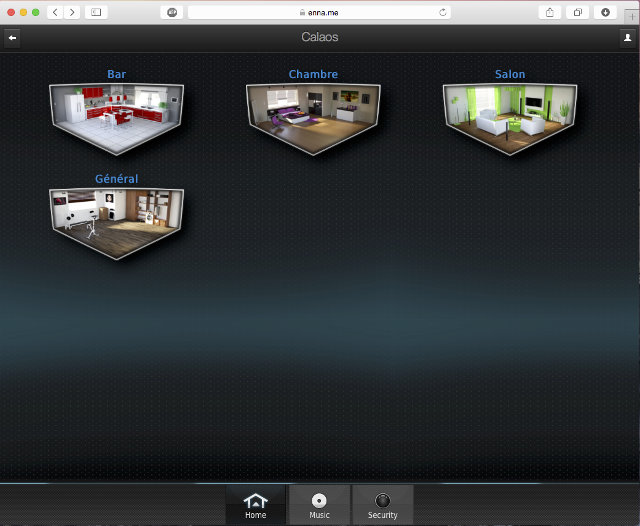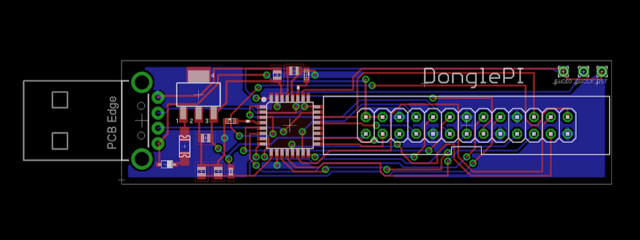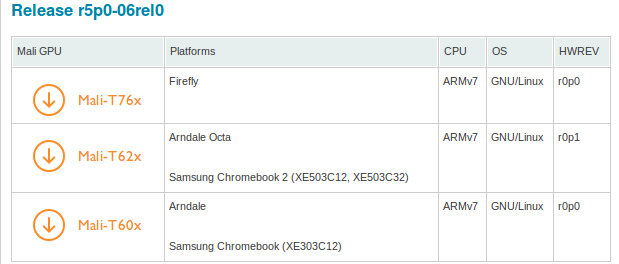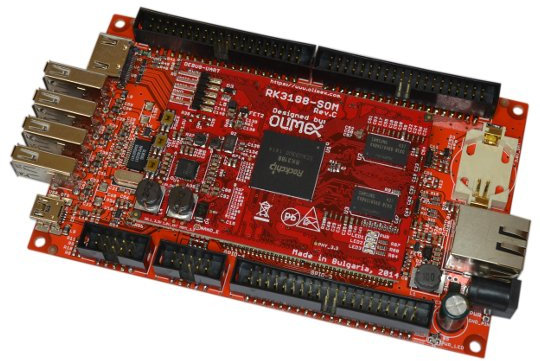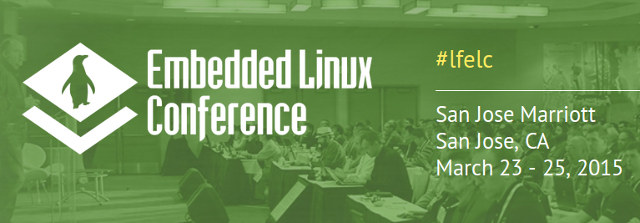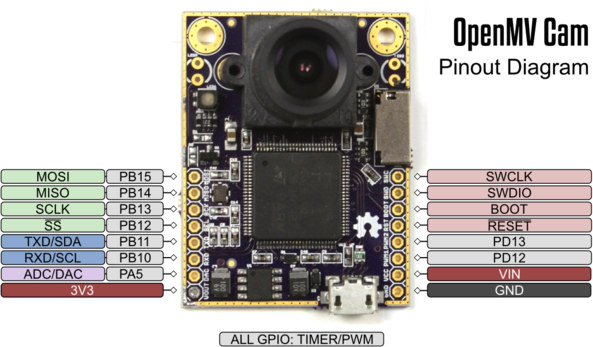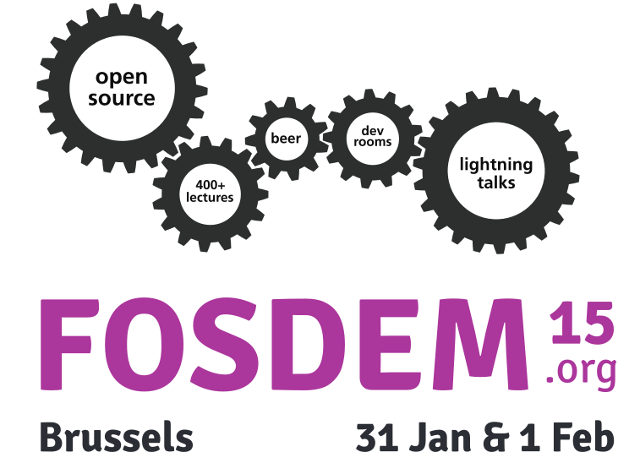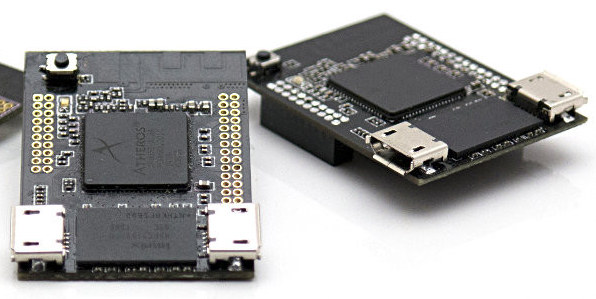Calaos is a Linux based home automation software released under GPLv3 license that works on Raspberry Pi, some Allwinner platforms like Cubiebaord 1/2, Mele A1000(G)/A2000, as well as x86 / amd64 hardware platforms that allows you control switches & lights in the rooms of your home or office, control your music, and manage security cameras.. The developers have recently released Calaos v2.0, the first stable release, so it’s a good time to have a look. The software stack is comprised of 6 main components: Calaos Server – Daemon that exports the state of the house via a JSON protocol. It can currently manage the following hardware components and protocols: Wago’s PLC, with digital or analog I/O, DALI or DMX light bus IPX800 web relay board GCE Electronics Eco Devices used to monitor power consumption. Web API 1-Wire, X10 Zibase I/O GPIO (Linux based GPIO, for direct use of RaspberryPI GPIO […]
DonglePi is a USB Dongle with a Raspberry Pi Header for your PC
While the newer Raspberry Pi A+, B+ and B2 boards feature the new 40-pin connector, the Raspberry Pi boards Model A and B have a 26-pin expansion header, but both are use to access GPIOs, UART, SPI, I2C and interface with external hardware, and many add-ons boards have been developed for the Raspberry Pi. But what if you’d like to use R-Pi add-ons board on your PC, or instead you are developing your own add-on board, but would like to do so directly on your PC for convenience? DonglePi is the answer. It’s a small USB dongle with Atmel SAMD21 MCU and a 26-pin Raspberry Pi compatible header, that you could use connect to your Android/Linux/Windows PC to play with GPIO, I2C, SPI, Serial, PWM just like on a Raspberry Pi, and using RPi/GPIO or smbus Python libraries for programming. The project is still in development, and so far most […]
ARM Releases Kernel Drivers for Mali-T880 / T860 GPUs, User Space Drivers for Mali-T76x GPUs
ARM Mali GPU drivers includes both open source kernel drivers, and binary userspace drivers supporting framebuffer and/ior X11 implementation. The former is rarely an issue and is quickly released, but the latter requires porting and testing for a specific hardware platform, as well legal work, which greatly delay the releases. Mali-T880 GPU was announced at the beginning of the month together with ARM Cortex A72, and on February 17, 2015, ARM released an update to their Mali-T600 series, Mali-T700 series & Mali-T860/T880 GPU kernel device drivers with revision r5p1-00rel0 that adds supports to Mali-T860 and Mali-T880 GPU. These open source drivers are available for Android and Linux, and also support early Mali-T700 and T600 GPUs. Separately, the company has also released Mali-T76X GPU drivers for Firefly board powered by Rockchip RK3288 quad core Cortex A17 processor featuring a Mali-T764 GPU. The first release only supports the framebuffer driver, but ARM […]
Olimex Announces Availability of TI AM3352 and Rockchip RK3188 SoM and Evaluation Boards
Olimex showcased prototypes for both Texas Instruments Sitara AM3352 and Rockchip RK3188 system-on-modules and evaluation boards in May 2014. However, development and production took a bit longer than expected, and the company has just announced availability of the platforms now. Rockchip RK3188 CPU Modules and Kit RK3188-SOM-EVB kit specifications: RK3188-SOM-4GB System-on-Module with the following key features: SoC – Rockchip RK3188 quad core Cortex A9 processor @ 1.6GHz with Mali-400MP4 GPU System Memory – 1GB DDR3 Storage – 4GB Flash + micro SD slot Debugging – 4-pin UART connector Misc – Reset and Recovery buttons, 3x status LEDs Dimensions – 55.88 x 81.28 mm Video Output – HDMI output + LCD output Connectivity – 10/100Mbps Ethernet USB – 4x USB Hosts, 1x micro USB OTG Expansion Connectors LCD connector for LCD-OLinuXino-XX LCDs 2x UEXT connectors 2x 40 pin GPIO connectors Misc – RTC with backup battery Power Supply – 6-16 V via […]
Embedded Linux Conference 2015 Schedule – IoT, Cars, and Drones
Embedded Linux Conference 2015 will take place in San Jose, California, on March 23 – 25, 2015, and will focus on Drones, Things and Automobiles. The schedule has been published, and whether you’ll attend or not, it’s always interested to have a look at what will be talked about to have a peak into the future of Embedded Linux, or simply keep abreast with the progress in the field. So as usual, I’ve gone through the schedule, and made my own virtual program with talks that I find interesting. Monday 23rd 9:00 – 9:30 – Driving standards and Open Source to Grow the Internet of Things by Mark Skarpness, Director of Systems Engineering at Intel Billions of devices are beginning to come online, and many of these devices, large and small, are running open source software. To fuel this innovation, it’s more important than ever for these devices to use […]
OpenMV is an Open Source Hardware VGA Camera Controllable with Python Scripts (Crowdfunding)
Recently I’ve seen some activity about tiny cameras for makers, including Linux based SinoVoIP BPI-D1 recording up to 720p30 videos, and an upcoming mini camera for VoCore Wi-Fi module. There’s now another project called OpenMV, and open source camera for machine vision applications based on STMicro STM32, recording up to VGA resolution at 20 fps, and controlled using Micro Python scripts. OpemMV camera specifications: MCU – STM32F427, 180MHz, 225 DMIPS, 256K SRAM, 2M Flash, DMA/FPU/DSP/DCMI/SDIO/2D Acceleration Camera – 2MP OV2640 sensor with interchangeable M12 lens, 2x IR LEDS Storage – uSD interface: SDIO (4-bit mode) Expansions – 2x headers with USART, SPI, I2C, PWM, ADC/DAC, GPIOs, PWM and power signals USB – micro USB 2.0 Full Speed port Power Supply – 5V via USB; Current draw is approximately 140mA, steady state Dimensions – 4.57 x 3.56 cm The camera can be controlled using (Micro) Python scripts. with the project’s OpenMV […]
FOSDEM 2015 Schedule – January 31 – February 1 2015
FOSDEM (Free and Open Source Software Developers’ European Meeting) takes place every year during the first week-end of February. This year the developer-oriented event expects to bring over 5000 geeks to share ideas and collaborate on open source projects. Contrary to most other events, it’s free to attend, and you don’t even need to register, just show up. FOSDEM 2015 will take place on January 31- February 1 in Brussels. There will be 551 sessions divided into 5 keynotes, 40 lightning talks, 6 certification exams, and with the bulk being developer rooms and main tracks, divided into 7 main tracks this year: Languages, Performance, Time, Typesetting, Hardware, Security and Miscellaneous. I’m not going to attend, but it’s still interested to see what will be talked about, and I’ve concocted my own little virtual program out of the main tracks and developers’ rooms. There’s a few minutes overlap between some talks […]
Black Swift is a Tiny OpenWRT Wi-Fi Board Powered by Atheros AR9331 (Crowdfunding)
In case you thought there were not enough Wi-Fi board in the market already, here’s another one with Black Swift. The board runs OpenWRT, is a little larger than Vocore, and quite smaller than WRTnode, is powered by Atheros AR9331, provides access to I/Os via headers, and comes with two micro USB ports which should make it easy to use, and allow some interesting applications with USB devices. Black Swift specifications: SoC – Qualcomm Atheros AR9331 32-bit MIPS 24K CPU core @ 400 MHz, or 200 MHz in energy-saving mode selectable by software System Memory – 64 MB DDR2 SDRAM Storage – 16 MB NOR flash Connectivity – 802.11 b/g/n Wi-Fi (1×1, up to 150 Mbps) with PCB antenna USB – 1 x microUSB for power, 1x microUSB 2.0 port Expansion – Headers for 26x GPIO, 2x Fast Ethernet, SPI, I²C, 1x 16550 UART, 1x USB 2.0 Misc – Factory reset […]


